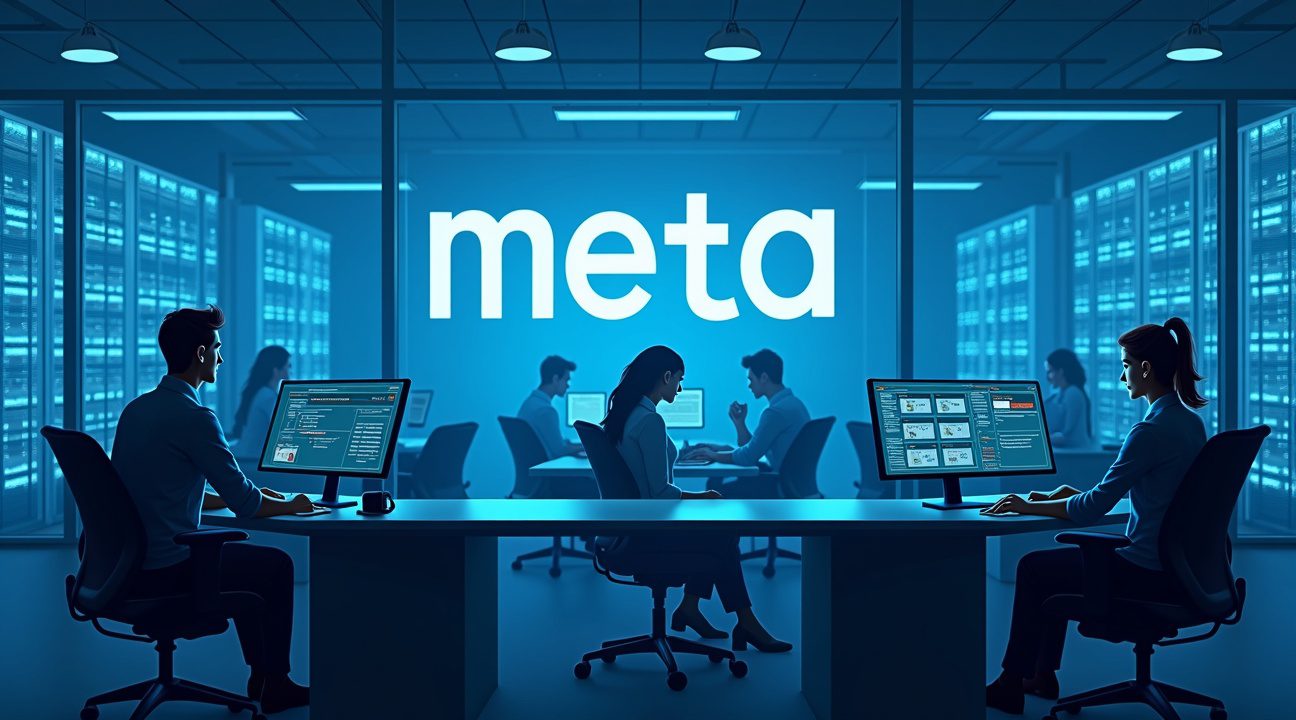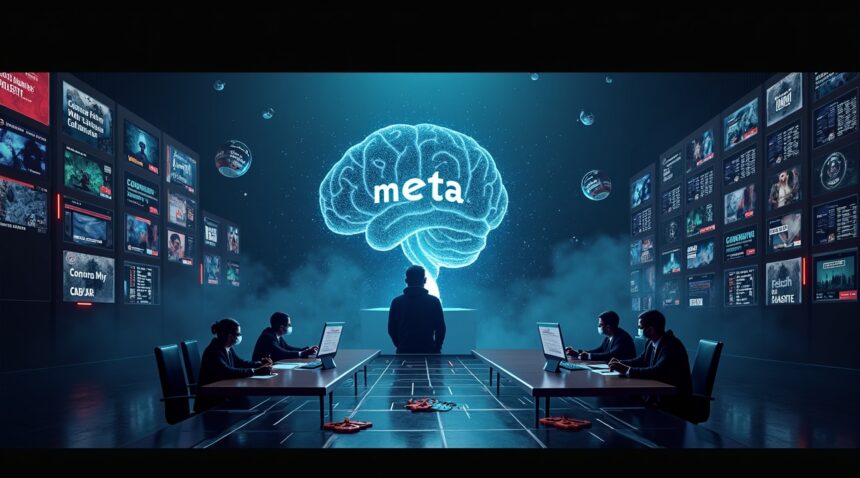Meta is facing intense scrutiny after reports emerged that the company downloaded 2,400 adult films through torrent networks, raising serious concerns about corporate data governance and ethical practices in AI development.
Key Takeaways
- Meta claims the torrented content was obtained for “personal use” and internal review, not for training AI systems or large language models.
- The company offered little transparency regarding which employees accessed the content, the conditions under which it was acquired, and the protocols that guided the activity.
- Privacy advocates and regulators have voiced concern over this incident, particularly due to ongoing allegations involving exposure of personally identifiable user information to contractors.
- This incident underscores legal complexities — especially when AI development intersects with copyright infringement, as torrenting protected works introduces liability issues irrespective of purpose.
- The controversy has incited a broader industry discussion about how AI companies handle data collection, with other organizations and regulators calling for stricter standards and more transparency.
Wider Implications for the Tech Industry
Employee Access and Content Governance
Meta’s vague explanation regarding how and why employees accessed the adult films leaves many questions unanswered. Experts are urging companies like Meta to implement stricter internal controls and audits to handle sensitive or potentially illicit content responsibly.
Legal Risks with Copyright and Data Sourcing
Downloading copyrighted adult content, even under claims of non-commercial or internal use, may constitute a legal violation. Companies must assess the risk of using any unlicensed third-party material in AI systems, where training on copyrighted content can result in far-reaching consequences.
Privacy and Ethical Concerns
Previous incidents involving contractors’ exposure to private user data place Meta under a microscope. Privacy experts argue that this latest event reflects broader systemic flaws in how platforms collect, store, and utilize data for AI projects.
Calls for Transparency and Reform
In the wake of this controversy, industry leaders and policy makers advocate for greater transparency around AI training datasets. Publications like The Verge and privacy-focused organizations are pushing for reform in how AI companies declare and validate data sources to ensure ethical compliance.
The Meta case may set a precedent for how seriously companies take internal oversight and legal responsibility in the accelerating race to develop advanced AI.
Meta Clarifies 2,400 Adult Films Were Downloaded for “Personal Use,” Not AI Training
Meta faces intense scrutiny after reports emerged that the company downloaded 2,400 adult films through torrent networks, prompting the tech giant to issue a clarification that has raised more questions than answers. The company maintains these downloads were strictly for “personal use” and had no connection to training their large language models or generative AI systems.
Corporate Defense and Transparency Concerns
The clarification came following leaked information and mounting pressure from privacy advocates and industry watchdogs examining Meta’s AI data collection practices. According to reporting from Reuters and other news outlets, Meta emphasized that employees accessed this content for internal review purposes rather than incorporating it into datasets designed for AI training.
Meta’s representatives stress that these downloads fall under compliance or content review activities, asserting the films never made their way into AI model development datasets. This distinction between personal use and AI training forms the cornerstone of the company’s defense strategy, though critics find the explanation unconvincing.
Industry Standards and Unusual Justifications
The “personal use” claim within a corporate environment has drawn significant criticism from technology experts and transparency advocates. Standard AI data acquisition typically involves massive, diverse datasets gathered through legitimate partnerships, public repositories, or licensed content agreements.
Several key concerns have emerged from Meta’s explanation:
- The unusual nature of claiming “personal use” for corporate downloads raises questions about employee oversight and company policies
- Lack of transparency regarding who accessed the content and under what specific circumstances
- Unclear protocols for determining what constitutes legitimate “internal review” versus unauthorized downloads
- Potential implications for how Meta handles sensitive content across its platforms
Critics argue that even if the content wasn’t used for AI training, the company’s explanation fails to address why employees were torrenting copyrighted adult material using company resources. The distinction Meta draws between this activity and their standard AI data collection practices doesn’t satisfy those calling for greater transparency in how tech companies handle content acquisition.
Industry analysts note that legitimate content review typically involves partnerships with content providers or accessing material through proper licensing channels. The torrent-based acquisition method raises additional questions about Meta’s internal processes and whether adequate safeguards exist to prevent unauthorized content access.
Meta’s stance attempts to separate this incident from their broader AI development efforts, which the company says follow established industry practices for dataset compilation. However, the explanation has done little to quell concerns about oversight and accountability within one of the world’s largest technology companies.

Privacy and Data Handling Practices Spark Widespread Criticism
Meta faces intense scrutiny from regulators and privacy advocates over its controversial approach to collecting and processing user data for AI training purposes. The company’s AI chatbot achieved remarkable growth, reaching over 1 billion monthly active users as of May 2025, but this success came with significant privacy-related consequences.
Contractors Exposed to Personal Information During Data Analysis
Investigations revealed that Meta’s data collection methods involve analyzing public posts and conversations through third-party contractors. During this process, these contractors frequently encountered bundles containing personally identifiable information that users never intended to share publicly. The exposed data included:
- Full names and email addresses
- Personal selfies and photographs
- Private conversation snippets
- Location data and contact information
- Sensitive personal details from social media profiles
This exposure occurred despite Meta’s claims that proper safeguards were in place. While the company insisted that the 2,400 films mentioned in recent reports weren’t part of this particular dataset, the broader issue of private data reaching AI contractors has amplified concerns about the company’s data handling practices.
European Union regulators, particularly in Germany, have raised serious questions about Meta’s legal foundation for processing such information. Under the General Data Protection Regulation (GDPR) and the Digital Markets Act, companies must establish clear lawful bases for data processing, especially when it involves AI training algorithms.
The regulatory challenge centers on consent mechanisms and whether Meta provides adequate protection for user privacy. Critics argue that the company’s current opt-out model places an unfair burden on users, who must actively discover and navigate complex settings to prevent their data from being used in AI training. Privacy advocates contend that an opt-in system would better protect user rights by requiring explicit consent before any data processing occurs.
Meta’s approach contrasts sharply with other tech companies that have implemented more restrictive data collection policies for AI development. The company maintains that its methods comply with existing regulations and that users retain control over their data through privacy settings. However, the complexity of these settings and the default opt-in nature of data collection continue to draw criticism from regulatory bodies.
The controversy extends beyond individual privacy concerns to broader questions about corporate responsibility in AI development. Regulators worry that current practices may set precedents that could undermine user trust and privacy protections across the tech industry. The ongoing investigations have prompted calls for clearer guidelines and stricter enforcement of existing privacy laws.
German data protection authorities have been particularly vocal about their concerns, suggesting that Meta may lack sufficient legal justification for its current data processing activities. These authorities argue that the scale and scope of data collection for AI training purposes require more stringent oversight and user protections than what currently exists.
The debate has highlighted fundamental tensions between AI innovation and privacy rights. While companies argue that extensive data collection enables better AI services, privacy advocates warn that current practices may normalize invasive data harvesting without meaningful user consent. This tension continues to shape regulatory discussions across multiple jurisdictions, with the European Union leading efforts to establish clearer boundaries for AI data collection practices.
Copyright Law Creates Legal Minefield for Torrented Content in AI
Meta’s assertion that the 2,400 adult films were downloaded for personal use rather than AI training creates a complex legal battleground where copyright law intersects with emerging artificial intelligence technologies. This distinction between personal consumption and computational training could prove crucial in determining the company’s legal exposure.
Courts haven’t yet established clear precedent regarding the legality of using pirated or torrented content in AI training datasets. Recent rulings have provided limited fair use protections for companies using publicly available online content in generative AI training, but the inclusion of pirated material introduces significantly more legal risk. The distinction matters because downloading copyrighted content without permission for personal use carries different legal consequences than incorporating that same content into commercial AI systems.
Strategic Legal Positioning Through Use Classification
By claiming the material was used for compliance review or personal assessment, Meta attempts to draw a protective legal boundary. This classification potentially reduces their exposure under copyright law by framing the downloads as consumption rather than commercial exploitation. Legal scholars closely monitor cases involving Meta and Anthropic to understand how courts will balance market harm against the use of copyrighted works in AI-generated outputs.
The legal strategy reflects the broader uncertainty surrounding AI training data acquisition. Companies must carefully navigate the tension between comprehensive training datasets and copyright compliance. While some content creators have explicitly licensed their work for AI training, torrented material lacks such permissions, creating immediate legal vulnerability.
Copyright holders face significant challenges in proving direct harm from AI training use, particularly when the training data doesn’t appear recognizably in generated outputs. However, the unauthorized acquisition of content through torrenting represents a clear violation of distribution rights, regardless of subsequent use. This creates a two-pronged legal risk:
- The initial copyright infringement through torrenting
- Potential secondary liability for incorporating protected content into AI systems
The absence of clear judicial precedent places these practices in a high-risk legal gray area. Companies developing AI systems must weigh the potential benefits of comprehensive training data against substantial legal exposure. Meta’s emphasis on personal use rather than training purposes suggests recognition of these risks and an attempt to minimize liability through careful categorization of their content acquisition activities.

Transparency and Ethics Questions Emerge from Meta’s AI Practices
Meta’s handling of its AI data practices has brought significant scrutiny to the company’s approach to transparency and ethical considerations. The recent controversy highlights a pattern of inconsistent content policy enforcement that has drawn criticism from industry observers and users alike. After facing public backlash, Meta has reportedly withheld updated policy documents, raising questions about the company’s commitment to open dialogue about its AI development processes.
Industry Standards and Meta’s Position
The artificial intelligence sector is increasingly embracing synthetic data as a solution to ethical challenges, particularly when dealing with sensitive or explicit content for model training. This approach offers several advantages for companies developing AI systems:
- Reduces reliance on potentially problematic real-world content
- Provides greater control over training data quality and bias
- Minimizes legal and ethical complications associated with unauthorized content use
- Enables more precise targeting of specific training scenarios
However, Meta hasn’t publicly confirmed whether it’s incorporating synthetic content into its AI development pipeline to replace real media. This lack of disclosure stands in stark contrast to industry trends that favor greater openness about data sourcing and training methodologies.
Transparency has become essential not just for maintaining public trust, but for establishing best practices across the entire AI sector. Companies that openly share their methodologies and policy frameworks contribute to a more responsible development environment that benefits everyone in the field.
The contrast between Meta’s approach and that of competitors like OpenAI and Anthropic is particularly striking. These companies have made their policy documents and moderation frameworks more accessible to the public, demonstrating how transparency can coexist with competitive business practices. Their openness about techniques such as reinforcement learning from human feedback (RLHF) has set industry standards that make Meta’s more secretive approach appear outdated.
This transparency gap doesn’t just affect public perception—it potentially impacts the quality and safety of AI systems being developed. When companies share their approaches to content moderation and ethical considerations, it enables peer review and collaborative improvement of industry standards. Meta’s reluctance to engage in this level of openness may ultimately hinder both its own development progress and the broader advancement of responsible AI practices.
The company’s current stance raises fundamental questions about accountability in AI development and whether major tech companies should be required to disclose more detailed information about their training data sources and content handling procedures.

Regulatory Landscape Creates Compliance Challenges Across Jurisdictions
AI companies face increasingly complex legal hurdles as regulators across different regions implement varying standards for data use and privacy protection. Meta’s recent scrutiny highlights how challenging it has become to maintain consistent compliance strategies across multiple jurisdictions.
European regulators took a particularly close look at Meta’s data practices during their May 2025 review, with officials in Germany and Ireland conducting thorough examinations of the company’s data handling procedures. While these processes received approval, they came with significant reservations that continue to shape ongoing regulatory discussions. German agencies in Hamburg have maintained their watchful stance, expressing persistent concerns that have triggered additional investigations and raised the possibility of restrictions on specific data usage activities.
Distinguishing Between Data Usage Categories
Regulatory bodies now demand clear operational distinctions between different types of data usage, creating new compliance requirements for tech companies. Organizations must establish precise boundaries between several key activities:
- AI model training activities that use data to develop machine learning capabilities
- Content moderation systems that review and filter user-generated content
- Internal review processes labeled as personal use by company personnel
- Research and development initiatives that analyze user behavior patterns
The fragmented nature of global regulatory frameworks forces companies to develop separate compliance strategies for each jurisdiction where they operate. European data protection laws differ significantly from American regulations, while emerging markets continue to establish their own standards. This patchwork of requirements makes it nearly impossible to create a single, unified approach to data governance.
Companies must now invest substantial resources in legal teams that specialize in multiple regulatory environments. Each jurisdiction requires specific documentation, reporting procedures, and technical implementations that often conflict with requirements in other regions. The complexity increases exponentially when companies operate across continents, as they must simultaneously satisfy European privacy advocates, American business interests, and developing regulatory frameworks in Asia and other markets.
Meta’s situation illustrates how even seemingly straightforward categories like “personal use” can become legally problematic when viewed through different regulatory lenses. What one jurisdiction considers acceptable internal review, another might classify as unauthorized data processing. These definitional challenges create ongoing uncertainty for companies trying to establish compliant data practices while maintaining their competitive capabilities in AI development.
Industry-Wide Implications for AI Data Collection Standards
The Meta incident has sent shockwaves through the artificial intelligence sector, forcing companies to confront uncomfortable questions about their data collection practices. Tech giants across Silicon Valley are scrambling to review their own protocols as regulatory scrutiny intensifies. Companies that previously operated under loose interpretations of fair use and research exemptions now face the reality that public perception and legal frameworks are shifting rapidly.
Major AI developers including OpenAI, Google, and Anthropic are already experiencing increased pressure to disclose their training data sources. The controversy surrounding Meta’s adult content collection has highlighted how easily companies can find themselves in legal crosshairs when their data gathering methods lack clear documentation and purpose statements. Industry observers note that vague explanations about “research purposes” or “content moderation” won’t satisfy regulators or the public much longer.
Establishing Clear Data Usage Categories
Companies are now recognizing they must establish distinct categories for different types of data collection. The ability to differentiate between content gathered for compliance monitoring, safety filtering, and actual model training has become critical. Organizations that can’t clearly articulate these distinctions risk facing the same public relations nightmare that Meta currently endures.
Several key areas require immediate attention:
- Documentation of data collection purposes at the point of acquisition
- Clear retention policies that align with stated usage intentions
- Audit trails that can demonstrate compliance with internal policies
- Regular review processes to ensure data isn’t being repurposed without proper authorization
- Transparent reporting mechanisms for stakeholders and regulators
The pressure for transparency extends beyond just documenting what data companies collect. Stakeholders are demanding detailed explanations of how AI development workflows operate from start to finish. This includes everything from initial data sourcing through model training, validation, and deployment phases.
Regulatory bodies in both the United States and European Union are paying closer attention to AI training practices. The Meta controversy has provided regulators with a concrete example of how current oversight mechanisms may be insufficient. Companies that proactively establish comprehensive data governance frameworks will likely find themselves better positioned when new regulations inevitably emerge.
The reputational risks associated with questionable data collection practices are becoming too significant to ignore. Meta’s stock price fluctuations and negative media coverage demonstrate how quickly public sentiment can turn against companies perceived as overstepping ethical boundaries. Other tech firms are taking note and adjusting their risk assessment models accordingly.
Industry leaders are beginning to implement more stringent internal review processes for data acquisition. These new procedures often involve legal teams earlier in the collection process and require explicit approval for any data that might raise ethical concerns. The goal is preventing situations where companies find themselves defending collection practices they can’t adequately justify.
The shift affects smaller AI startups just as much as established tech giants. Venture capitalists are now asking more pointed questions about data sourcing during funding rounds. Startups that can’t demonstrate responsible data collection practices may find themselves at a competitive disadvantage when seeking investment.
Legal experts predict that data collection standards will become increasingly codified through both industry self-regulation and government oversight. Companies that wait for explicit regulatory guidance may find themselves playing catch-up with competitors who’ve already implemented comprehensive data governance systems.
The Meta incident serves as a watershed moment that will likely influence AI development practices for years to come. Companies across the industry are realizing that the era of collecting first and asking questions later has ended. Those that adapt quickly to these new expectations will maintain their competitive edge while avoiding the regulatory and reputational pitfalls that have ensnared Meta.
Sources:
Taylor Wessing, “Meta may continue to train AI with user data”
Business Insider, as reported by Business & Human Rights Resource Centre, “Meta AI allegedly linked to widespread privacy concerns, exposing personally identifiable information to contractors”
Data Protection Commission, “DPC statement on Meta AI”
Nate’s Substack, “Meta’s AI Ethics Scandal & How to Fix It”
Reed Smith, “A New Look at Fair Use: Anthropic, Meta, and Copyright in AI Training”
eWeek, “Meta Contractors Viewed Explicit Photos and Personal Data from AI”


